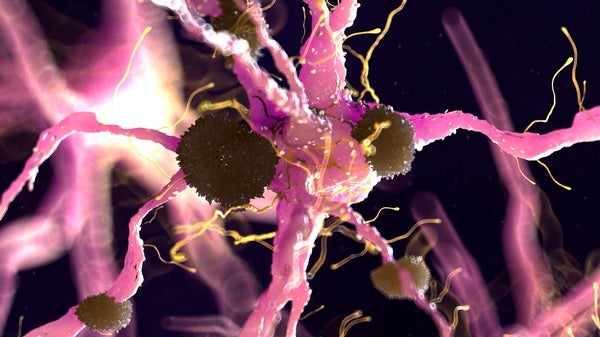
"A large team of researchers affiliated with a host of institutions across South Korea has developed a possible blood test to detect the early stages of Alzheimer's disease in patients who have yet to exhibit symptoms."
Posts published in “Research”
"Using a machine-learning approach, investigators identified four plasma proteins that correlate with cerebrospinal fluid amyloid-beta-1-42 status; these proteins plus apolipoprotein E4 genotype predicted amyloid positivity."

"Oxford Brain Diagnostics believe that their technology can catch the condition years before symptoms become apparent. Oxford Brain Diagnostics (OBD) is the result of an 8-year collaboration between Professor Steven Chance (neuroscience and pathology) and Professor Mark Jenkinson (brain imaging). They have developed a new method that directly measures the cellular health of patients' brain circuits from standard MRI data. "

"The Alzheimer’s Association estimates that more than 5.8 million Americans have Alzheimer’s disease, a number that will double by 2040 and cost $1 trillion per year by 2050. Currently, there are no therapies to prevent or stop the progression of Alzheimer’s once it develops. This dire situation needs a solution."
"My research looks at very important cells in the brain called microglia. Their job is to protect other brain cells we call neurons, which send information around the brain. We think in Alzheimer’s disease the microglia become exhausted and they can’t function as well as they should, and this could be linked with the damage that happens to the brain as Alzheimer’s disease progresses."

"Light physical activity—even an activity as simple as retrieving your mail or taking the dog on a walk—could keep your brain healthy, according to new evidence from Boston University School of Medicine."

"A hallmark of Alzheimer’s disease is memory loss, occurring during the later stages of the disease. But what if it was possible to restore memories? Researchers in Buffalo, New York are investigating how this could be possible."
"How quickly do we experience the benefits of exercise? A new University of Maryland study of healthy older adults shows that just one session of exercise increased activation in the brain circuits associated with memory - including the hippocampus - which shrinks with age and is the brain region attacked first in Alzheimer's disease."

"An older adult’s low awareness of scams may be an indicator that he or she may receive a diagnosis of Alzheimer’s disease or mild cognitive impairment in the future, according to the results of a study published in Annals of Internal Medicine."

"Researchers have developed synthetic peptides that can target and inhibit small, toxic aggregates related to Alzheimer’s disease."
